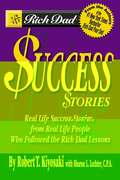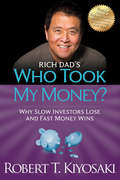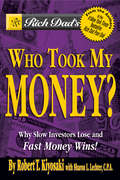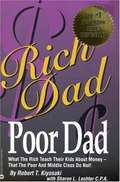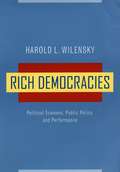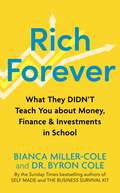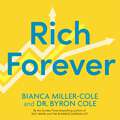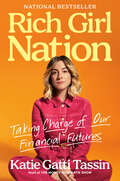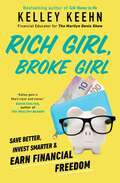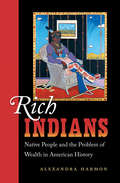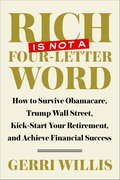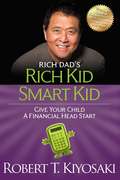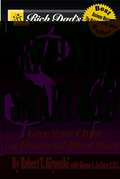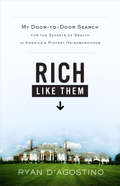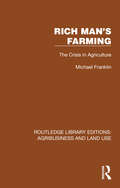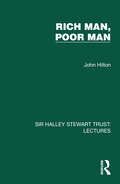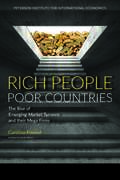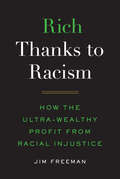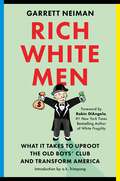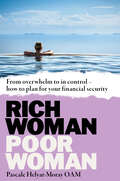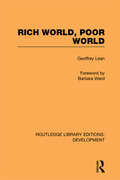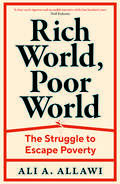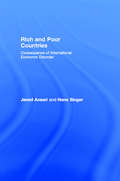- Table View
- List View
Rich Dad's Success Stories: Real Life Success Stories from Real Life People Who Followed the Rich Dad Lessons
by Robert T. Kiyosaki Sharon L. LechterAn extraordinary collection of business success stories--all applying the principles from the #1 "New York Times" bestseller "Rich Dad Poor Dad."
Rich Dad's Who Took My Money?
by Robert T. KiyosakiLearn what financial advisors don't want you to know!Robert's rich dad often told him: "The faster your money moves, the higher the returns and the lower your risk." Conventional financial wisdom recommends that you save money and invest for the long term. In other words: park your money.That was not rich dad's advice. He taught Robert to increase the velocity of my money. And, even if you start small, it's advice that anyone can follow and benefit from.
Rich Dad's Who Took My Money?: Why Slow Investors Lose and Fast Money Wins! (Rich Dad Series)
by Robert T. Kiyosaki Sharon L. LechterFor the first time ever, the #1 New York Times bestselling authors reveal how to actually speed up and maximize the return on investments to achieve total financial independence. Most people think that simply getting a modest return on one's investments is going to take care of them forever, right through their golden years of retirement. But for lots of investors, waiting-and hoping-for a 10% return on their stocks, bonds, and mutual funds is turning out to be a long and perilous wait. In this startling new book, Robert Kiyosaki shows how one can velocitize their money in such a way that they can quickly achieve financial wealth with extraordinary returns and amazing growth. Sound too good to be true? It's not-and Kiyosaki and Lechter show how anyone can make the move right now.
Rich Dad, Poor Dad: What the Rich Teach Their Kids About Money - That the Poor and Middle Class Do Not!
by Robert T. Kiyosaki Sharon L. LechterThe main reason people struggle financially is because they have spent years in school but learned nothing about money. The result is that people learn to work for money, but never learn to have money work for them.
Rich Democracies: Political Economy, Public Policy, and Performance
by Harold L. WilenskyWith his 30 years of systematic, comprehensive comparison of 19 rich democracies, Wilensky answers two basic questions: (1) What is distinctly modern about modern societies--in what ways are they becoming alike? and (2) How do variations in types of political economy shape system performance?
Rich Forever: What They Didn’t Teach You about Money, Finance and Investments in School
by Bianca Miller-Cole Byron ColeWe all want financial freedom. But we also know just how much pressure the subject of money exerts on us, and many of us feel our personal finances are out of control. But that's not surprising - after all, no-one ever explained how to manage money properly - or if they did, we didn't listen.If a head-in-the-sand approach to personal finance ever worked, it doesn't now. Not only do we openly worry about the state of our finances and the cost of living, we increasingly yearn for the kind of financial independence which will enable us to do our own thing and live life to the full. This paradox is right at the heart of everything we do, and a solution is needed.This book will teach you everything you should have learned about money at school - but didn't. It will stop you waking in the middle of the night to check you have enough money for your home, your childcare, your summer holiday or your secret masterplan.And the process of learning how to embrace, not hide, from your financial responsibilities will release you from layers of anxiety, shame and confusion.You will learn how to be rich forever - rich in time, rich in freedom, rich in opportunity. It will revolutionise the way you think and feel about money and free you to grow!
Rich Forever: What They Didn’t Teach You about Money, Finance and Investments in School
by Bianca Miller-Cole Byron ColeWe all want financial freedom. But we also know just how much pressure the subject of money exerts on us, and many of us feel our personal finances are out of control. But that's not surprising - after all, no-one ever explained how to manage money properly - or if they did, we didn't listen.If a head-in-the-sand approach to personal finance ever worked, it doesn't now. Not only do we openly worry about the state of our finances and the cost of living, we increasingly yearn for the kind of financial independence which will enable us to do our own thing and live life to the full. This paradox is right at the heart of everything we do, and a solution is needed.This book will teach you everything you should have learned about money at school - but didn't. It will stop you waking in the middle of the night to check you have enough money for your home, your childcare, your summer holiday or your secret masterplan.And the process of learning how to embrace, not hide, from your financial responsibilities will release you from layers of anxiety, shame and confusion.You will learn how to be rich forever - rich in time, rich in freedom, rich in opportunity. It will revolutionise the way you think and feel about money and free you to grow!
Rich Forever: What They Didn’t Teach You about Money, Finance and Investments in School
by Bianca Miller-Cole Byron ColeDiscover what they should have taught you about money, finance and investment at schoolRemember when talking about money was taboo? Times have changed and in our times, with so many radical and disruptive changes to the economy, the role of the entrepreneur now embedded at the centre of so much societal and technological change, and digital currencies changing the way we think about exchange, money has become a vital, insistent of conversation for everyone. All of us acknowledge it matters desperately; yet so few of us really understand it.The press and social media are awash with rags to riches stories, stories of kitchen table businesses that become multi-million-pound enterprises. Stories of teenagers and young adults investing in digital currencies from their bedrooms. On the flip side of these aspirational stories there is the reality of the everyday person who simply wants to understand what to and what not to do with their money. Should they save or invest, if they invest - what in, if they save - what for? Should they buy a home or rent, should they live for the moment or live for retirement. How does having credit provide more credit and would insurance be the best bet if all falls around you and what the hell is APR anyway?Finance and money are topics we all wish we learnt at school but instead we find ourselves having to 'learn on the job', having to do deep investigations and 'trust' the advice from online experts. There must be a better way and a better place to go to for this insight and here we have it, courtesy of two authors who have known hardship and huge success - "What they should have taught you about money, finance and investment at school' to fill that void.(P)2023 Hodder & Stoughton Limited
Rich Girl Nation: Taking Charge of Our Financial Futures
by Katie Gatti TassinFrom the founder of Money with Katie, a leveled-up finance guide for ambitious women everywhere—and a rallying cry for a new money movementWomen experience money differently than men do. In the United States, women have only 55 cents for every dollar of wealth held by men, are more likely to end up in poverty following a divorce, and are less likely to retire with the resources they need. What can women do to build wealth and claim financial power in a system that wasn&’t designed for them?Katie Gatti Tassin, personal finance writer and host of the popular podcast The Money with Katie Show, has built an energized following of smart, ambitious women seeking a deeper understanding of the financial issues that affect them. In Rich Girl Nation, Tassin deconstructs the unique challenges women face on their journey to financial freedom, offering context and nuanced guidance on money matters including: • Performing a budgetary &“Hot Girl Detox&” • Proven salary negotiation strategies that effectively navigate gender bias • Investing frameworks that make you the leader of your financial life• How (and why) to create a prenup• Preparing and saving for childcare efficiently• Retiring independently (and in a tax-optimized way)Packed with scrupulous research and Tassin&’s trademark wit, Rich Girl Nation uncovers the real story behind our financial system and shows us exactly how to thrive within it while we fight for broader change. It&’s time for women to unite in unapologetic financial autonomy with the net worths to show for it—and to change the playing field not just for ourselves but for the next generation of Rich Girls, too.
Rich Girl, Broke Girl: Save Better, Invest Smarter, and Earn Financial Freedom
by Kelley KeehnThe bestselling author of Talk Money to Me teaches women how to feel confident about their money, save and spend wisely, and advocate for themselves.Do you want to know how to pay off that debt and start saving? Ready to negotiate a salary raise or better benefits? Do financial terms and options make your head spin? Here&’s the good news: we as women have more financial freedom and money now than ever before. Here&’s the bad news: when it comes to money, many women become paralyzed by financial management and sometimes even defer big decisions to other people, much to their detriment. What&’s the solution? Financial empowerment. In this handy guide, you will learn how to: -Discuss money with your partner -Determine realistic and attainable goals -Negotiate for the salaries and benefits you deserve -Splurge occasionally while still saving money -Understand financial risks and make good investments -Gain control of your financial destiny With years of experience as a personal finance educator, bestselling author Kelley Keehn will give you the tools you need to keep and grow your wealth, even if you don&’t have much to start from—yet. This unique book brings to life the most common financial conundrums women face, teaching you how to save, spend, invest, and plan for a strong financial future.
Rich Indians Native People and the Problem of Wealth in American History
by Alexandra HarmonLong before lucrative tribal casinos sparked controversy, Native Americans amassed other wealth that provoked intense debate about the desirability, morality, and compatibility of Indian and non-Indian economic practices. Skillfully blending social, cultural, and economic history, Alexandra Harmon examines seven such instances of Indian affluence and the dilemmas they presented both for Native Americans and for Euro-Americans--dilemmas rooted in the colonial origins of the modern American economy. This wide-ranging book looks at controversies concerning Powhatan economic status and aims during the Virginia colony's first years, the ambitions of some bicultural eighteenth-century Creeks and Mohawks, prospering Indians of the Southeast in the early 1800s, inequality among removed tribes during the Gilded Age, the spending of oil-rich Osages in the Roaring Twenties, resurgent tribal communities from Alaska to Maine in the 1970s, and casinos that have drawn gamblers to Indian country across the United States since the 1990s. Harmon’s study not only compels us to look beyond stereotypes of greedy whites and impoverished Indians, but also convincingly demonstrates that Indians deserve a prominent place in American economic history and in the history of American ideas through the twentieth century. Long before lucrative tribal casinos sparked controversy, Native Americans amassed other wealth that provoked intense debate about the desirability, morality, and compatibility of Indian and non-Indian economic practices. Skillfully blending social, cultural, and economic history, Alexandra Harmon examines seven such instances of Indian affluence and the dilemmas they presented both for Native Americans and for Euro-Americans--dilemmas rooted in the colonial origins of the modern American economy. This wide-ranging book looks at controversies concerning Powhatan economic status and aims during the Virginia colony's first years, the ambitions of some bicultural eighteenth-century Creeks and Mohawks, prospering Indians of the Southeast in the early 1800s, inequality among removed tribes during the Gilded Age, the spending of oil-rich Osages in the Roaring Twenties, resurgent tribal communities from Alaska to Maine in the 1970s, and casinos that have drawn gamblers to Indian country across the United States since the 1990s. Harmon’s study not only compels us to look beyond stereotypes of greedy whites and impoverished Indians, but also convincingly demonstrates that Indians deserve a prominent place in American economic history and in the history of American ideas through the twentieth century.
Rich Is Not a Four-Letter Word: How to Survive Obamacare, Trump Wall Street, Kick-start Your Retirement, and Achieve Financial Success
by Gerri WillisIn a fiery polemic on our personal finances, Gerri Willis, anchor and personal finance correspondent for Fox Business News, reveals how liberal policy has decimated our wallets. In Rich Is Not a Four-Letter Word, veteran financial journalist and pundit Gerri Willis takes on the progressive mind-set championed by liberals that gives government bureaucrats the right to decide what's best for us, resulting in bigger government programs, more bureaucracy, and more wasted taxpayer money. She dissects Obamacare and Democratic tax initiatives to show how they have hamstrung the average American. Then she shows us how to overcome these left wing financial hurdles and grow our nest eggs, despite the political pickpocketing from Washington. Among the topics she tackles in the book: · How the progressive agenda has robbed Americans of their financial freedom (a new Blackrock survey shows that 4 out of 10 Americans haven't even started saving for retirement)--and how to get it back; · How the wide-open spigot of college loan dollars has encouraged college administrators to boost tuition each and every year--and how we can successfully navigate the system; · How, with a stroke of President Obama's pen, company-sponsored health-care coverage was put on deathwatch, as companies have begun to abandon employee health-care coverage and opt to pay a less expensive federal penalty; · Why the knee-jerk progressive response to the 2008 market crash and subsequent recession has acted as an albatross on the shoulders of American corporations, keeping corporate tax rates at sky high levels among Western nations--and what we can do to create jobs and jumpstart the economy.
Rich Kid Smart Kid
by Robert T. KiyosakiRich Kid Smart Kid is written for parents who value education, want to give their children a financial head start in life, and are willing to take an active role to make that happen.In the Information Age, a good education is more important than ever. But the current educational system may not be providing all the information a child needsto thrive in today's fast-paced, ever-changing world. This book was designed to fill in the gaps and to give your child the same inspiring and practical knowledge that Robert's rich dad gave him.Rich Kid Smart Kid will show you how to awaken your child's love of learning. It will open doors that many never knew existed and give parents the tools and skills and real-world experiences (financial field trips!) that they can share with their child, knowledge he or she can use for the rest of their life. Are you worried that school isn't preparing your child for the real world? It probably isn't. Rich Kid Smart Kid can bridge that gap.
Rich Kid, Smart Kid: Giving Your Child a Financial Head Start
by Robert T. Kiyosaki Sharon L. LechterRICH DAD'S RICH KID, SMART KID is written for parents who value education, want to give their child a financial and academic head start in life, and are willing to take an active role to make it happen. In the Information Age, a good education is more important than ever. But the current educational system may not be providing all the information your child needs. This book was designed to fill in the gaps, to help you give your child the same inspiring and practical financial knowledge that Robert Kiyosaki's rich dad gave him. RICH KID, SMART KID will show you how to awaken your child's love of learning using the same methods that Robert's smart dad used to help Robert stay in school, even though he had bad grades and often wanted to drop out. And RICH KID, SMART KID will open doors that you never knew existed, enabling you to pass down the skills and understanding your child will use for the rest of his or her life.
Rich Like Them: My Door-to-Door Search for the Secrets of Wealth in America's Richest Neighborhoods
by Ryan D'AgostinoRyan D'Agostino, former senior editor at Money, wanted to know how the wealthiest in America got that way. So he asked. Knocking on 500 doors in some of the most affluent zip codes in America, D'Agostino met with men and women who welcomed him in and shared their most difficult financial decisions, toughest setbacks, greatest strategies, most triumphant moments, and deepest insights. In RICH LIKE THEM, he weaves together what he learned and offers maxims for achieving wealth, such as "Never Let Pride Get in the Way of Profit," and "When you fail miserably, be thankful." Filled with inspiring stories and straight-up advice, RICH LIKE THEM is a lively and practical get-rich guide that any reader can follow.
Rich Man's Farming: The Crisis in Agriculture (Routledge Library Editions: Agribusiness and Land Use #10)
by Michael FranklinOriginally published in 1988, this book was written at a time of excessive budgetary costs, huge surpluses and damaging trade conflicts. This study examines why a crisis situation was allowed to develop, nd proposes the most effective ways, both nationally and internationally – to chieve more rational agricultural support and trade policies. It concentrates on the efforts to reform the Common Agricultural Policy in the EU, on United States support policies, and on the GATT negotiations.
Rich Man, Poor Man (Sir Halley Stewart Trust: Lectures)
by John HiltonFirst published in 1944 (Sir Halley Stewart Lectures 1938), the original blurb reads: “In Rich Man, Poor Man, Professor John Hilton examines the facts as to the distribution of wealth in this country. He finds that of our twelve million families only four million (a few of them immensely rich) are worth all told more than £100; four million are worth between a couple of pounds and a hundred; and four million live from hand to mouth, owning no more than they stand up in and sit down at – if that. But what about the £3, 000,000,000 of “Small Savings”? Professor Hilton answers. How comes it about that so few own so much of the wealth of the country, and so many own so little? Why are the poor poor and the rich rich? Is it because the poor are a poor sort and the rich are a rich sort? If not – what? The book tells of a special study of three hundred poor families.As for those of us in the middle range, whose real incomes have been steadily rising, what do we do with the extra? We spend some of it wisely. Professor Hilton goes on to examine various aspects of our spending, such as what we spend on pints, perms, poms, pictures and pools; and why: the curious and costly practice of burning fermented leaf-mold under the nose: twiddlers of fruit-machines and pin-tables: followers of dogs and horses: users of turnstiles and totalisators: knaves and thieves on the doorstep and in the letterbox: the £3, 000,000,000 of recent surplus we haven’t saved, and what would have happened if we had. “It’s the rich wot ‘elps the rich.” What it all means in terms of national well-being and strength, and what to do about it.”. Today it can be read and enjoyed in its historical context.This book is a re-issue originally published in 1944. The language used and views portrayed are a reflection of its era and no offence is meant by the Publishers to any reader by this re-publication.
Rich People Poor Countries
by Caroline FreundRich People Poor Countries: The Rise of Emerging-Market Tycoons and their Mega Firms, Rich People Poor Countries, Caroline Freund, Sarah Oliver, Peterson Institute for International Economics, PIIE, IIE, emerging-markets, tycoons, mega firms, billionaires, poor countries, industrial growth, super rich, multinational industries, service-based, global economy, modern world economy, 978-0-88132-703-8, 978-0-88132-704-5
Rich People Poor Countries: The Rise of Emerging-Market Tycoons and Their Mega Firms
by Caroline FreundLike the robber barons of the 19th century Gilded Age, a new and proliferating crop of billionaires is driving rapid development and industrialization in poor countries. The accelerated industrial growth spurs economic prosperity for some, but it also widens the gap between the super rich and the rest of the population, especially the very poor.In Rich People Poor Countries, Caroline Freund identifies and analyzes nearly 700 emerging-market billionaires whose net worth adds up to more than $2 trillion. Freund finds that these titans of industry are propelling poor countries out of their small-scale production and agricultural past and into a future of multinational industry and service-based mega firms. And more often than not, the new billionaires are using their newfound acumen to navigate the globalized economy, without necessarily relying on political connections, inheritance, or privileged access to resources. This story of emerging-market billionaires and the global businesses they create dramatically illuminates the process of industrialization in the modern world economy.
Rich Thanks to Racism: How the Ultra-Wealthy Profit from Racial Injustice
by Jim FreemanMore than fifty years after the civil rights movement, there are still glaring racial inequities all across the United States. In Rich Thanks to Racism, Jim Freeman, one of the country's leading civil rights lawyers, explains why as he reveals the hidden strategy behind systemic racism. He details how the driving force behind the public policies that continue to devastate communities of color across the United States is a small group of ultra-wealthy individuals who profit mightily from racial inequality.In this groundbreaking examination of "strategic racism," Freeman carefully dissects the cruel and deeply harmful policies within the education, criminal justice, and immigration systems to discover their origins and why they persist. He uncovers billions of dollars in aligned investments by Bill Gates, Charles Koch, Mark Zuckerberg, and a handful of other billionaires that are dismantling public school systems across the United States. He exposes how the greed of prominent US corporations and Wall Street banks was instrumental in creating the world's largest prison population and our most extreme anti-immigrant policies. Freeman also demonstrates how these "racism profiteers" prevent flagrant injustices from being addressed by pitting white communities against communities of color, obscuring the fact that the struggles faced by white people are deeply connected with those faced by people of color.Rich Thanks to Racism is an invaluable road map for all those who recognize that the key to unlocking the United States' full potential is for more people of all races and ethnicities to prioritize racial justice.
Rich White Men: What It Takes to Uproot the Old Boys' Club and Transform America
by Garrett NeimanWith a foreword by New York Times bestselling author Robin DiAngelo, this provocative book investigates major corporate boardrooms and presents a data-driven analysis of how rich white men have preserved their monopoly on power—and what we can do to stop them. It&’s no secret that our country has a serious problem when it comes to wealth inequality – and systemic racism and patriarchy have only exacerbated the advantages of wealthy white men. Over the past three decades, America&’s richest white men have only become richer, while those suffering in poverty have only gotten poorer. The divide may seem too great to bridge, but Rich White Men exposes the hidden and insidious ways that white male elites inherit, increase, and preserve their status—and, in this book, we get clear on how to uproot their monopoly on power. Serial nonprofit entrepreneur Garrett Neiman&’s day job is to get rich white men to donate money to good causes and organizations. In Rich White Men, Neiman brings us into corner offices of billionaires and the boardrooms of Goldman Sachs, McKinsey, Stanford, Harvard, and other enclaves of silver-spooned white men to illuminate the role of rich white men in the world and how they justify inequality. He uses the analogy of compound interest to illustrate how the advantages wealthy white men inherit give them a leg up at key moments in their lives, gilding their trajectories and shutting others out. Through this rare, insider access, readers will discover new ways to persuade the elite toward progressive solutions. A hopeful polemic, the book sheds light on dark truths about inequality and the people invested in preserving it while also providing a blueprint for how America can become an equitable democracy.Rich White Men reveals that to realize America&’s founding aspiration of life, liberty, and the pursuit of happiness, we must recognize, dismantle, and transform our current system into one that liberates us all – including this nation&’s morally and spiritually impoverished wealthy white men.
Rich Woman, Poor Woman: From overwhelm to in control – how to plan for your financial security
by Pascale Helyar-MorayRecord levels of women are retiring in poverty – the current figure is 1 in 6 in Australia. Should we be surprised when women earn less than men, shoulder the load when it comes to unpaid work at home, and take more and longer breaks from paid work to have children? The difference between a rich woman and a poor woman is very often financial literacy. Australia has a superannuation system, the envy of many other countries in world, and most of us don't understand it. Super school doesn't exist. Financial literacy as a wider topic has been taught in high schools since 2015 but, somehow, the crucial subject of superannuation is left out of the mix. Rich Woman, Poor Woman addresses this knowledge gap. Well-researched, practical and written in an easy-to-read style, Rich Woman, Poor Woman explores: • What exactly is super, and how it can work harder for you • How to adopt super money habits and make a plan to achieve financial independence • Set and forget strategies to grow your super faster • Hacks for all ages: women in their 20s, 30s, 40s, 50s and 60s.
Rich World, Poor World (Routledge Library Editions: Development)
by Geoffrey LeanThis reissue, first published in 1978, confronts a whole range of international development issues: hunger, energy, supply, population growth, pollution, the state of the cities, nuclear proliferation. Geoffrey Lean explains the interdependent contemporary crises within developing nations and presents the facts behind them, alongside the practical solutions, new strategies and fresh thinking present in contemporary development thinking.
Rich World, Poor World: The Struggle to Escape Poverty
by Ali A. AllawiA landmark history of the world economic order, exploring how developing countries have fought to escape impoverishment Over the past two decades, experiments in neoliberal economics have opened up a chasm of inequality between the Global South and the West. Development advice from richer nations has led to social upheaval, political unrest, environmental degradation—and even the creation of a new underclass. Brutal extremes of wealth and poverty are now commonplace. Ali A. Allawi traces the evolution of the world economic order from the late imperial era to the present day. Shedding light on continuing controversies, Allawi shows how the process of development has been hindered at every turn, from poor leadership and lost opportunities to widespread corruption. In doing so, he argues that the current neoliberal consensus is only the most recent of a series of failed policy imperatives. Covering issues in the Global South as well as failures in the West, this definitive account offers an impassioned and authoritative call for change.
Rich and Poor Countries: Consequence of International Economic Disorder
by Javed Ansari Hans SingerThis 4th edition has been revised to take account of the onset of world recession and the fall in commodity prices that have brought increasing poverty to some of the world's poorest countries.
